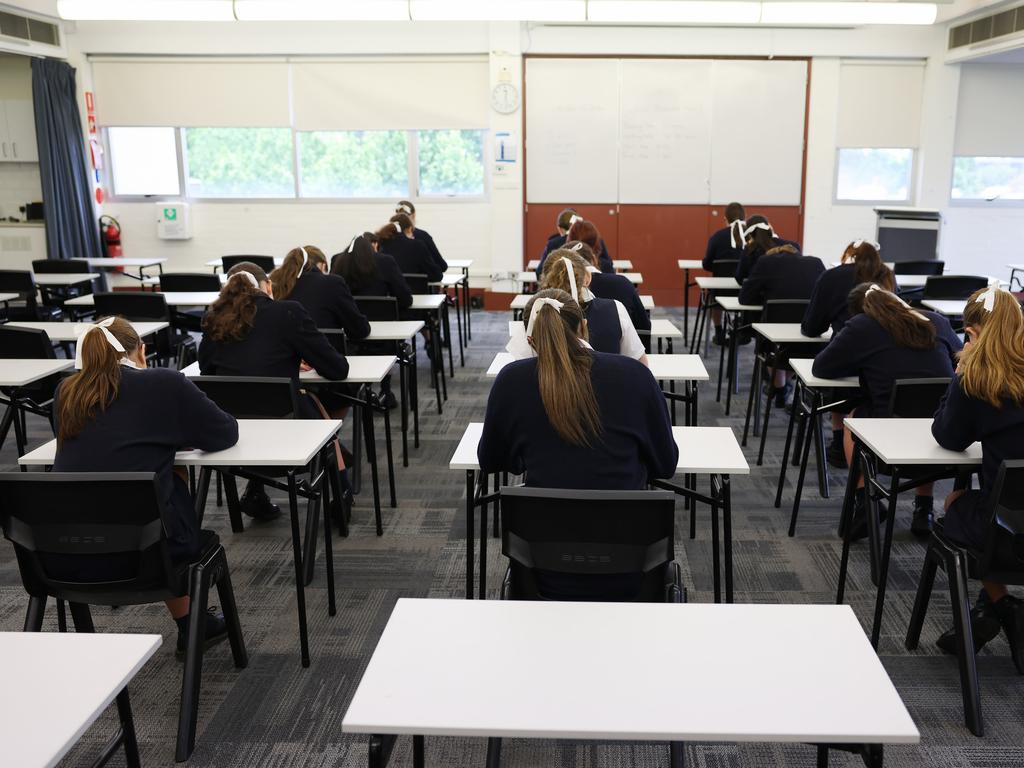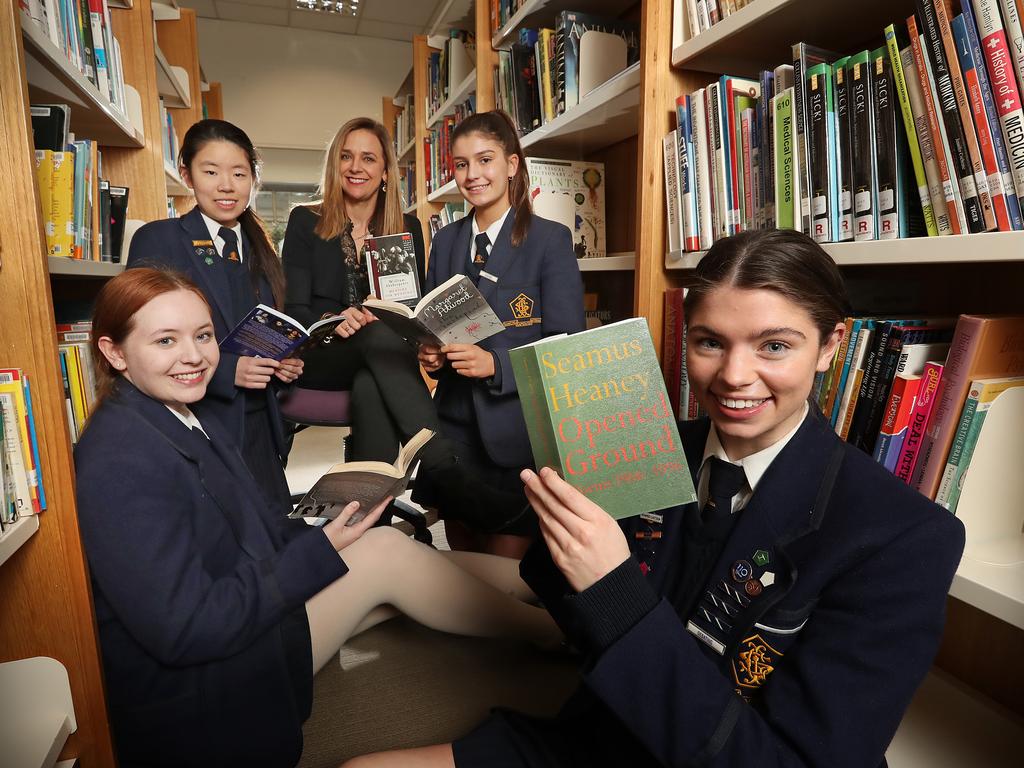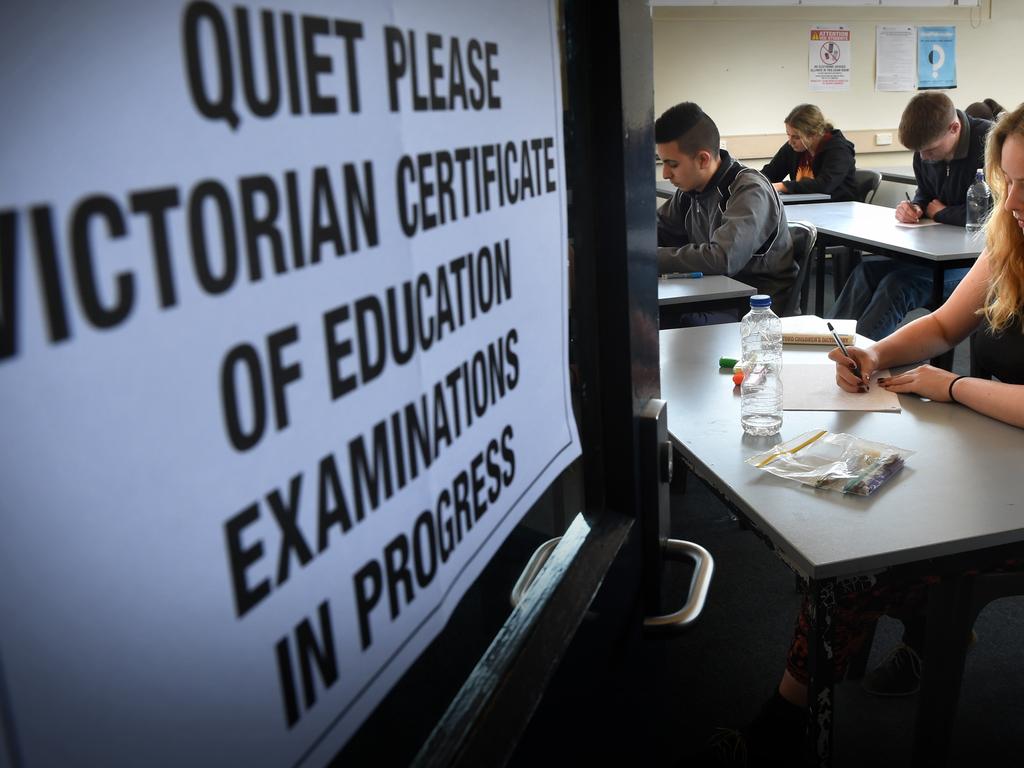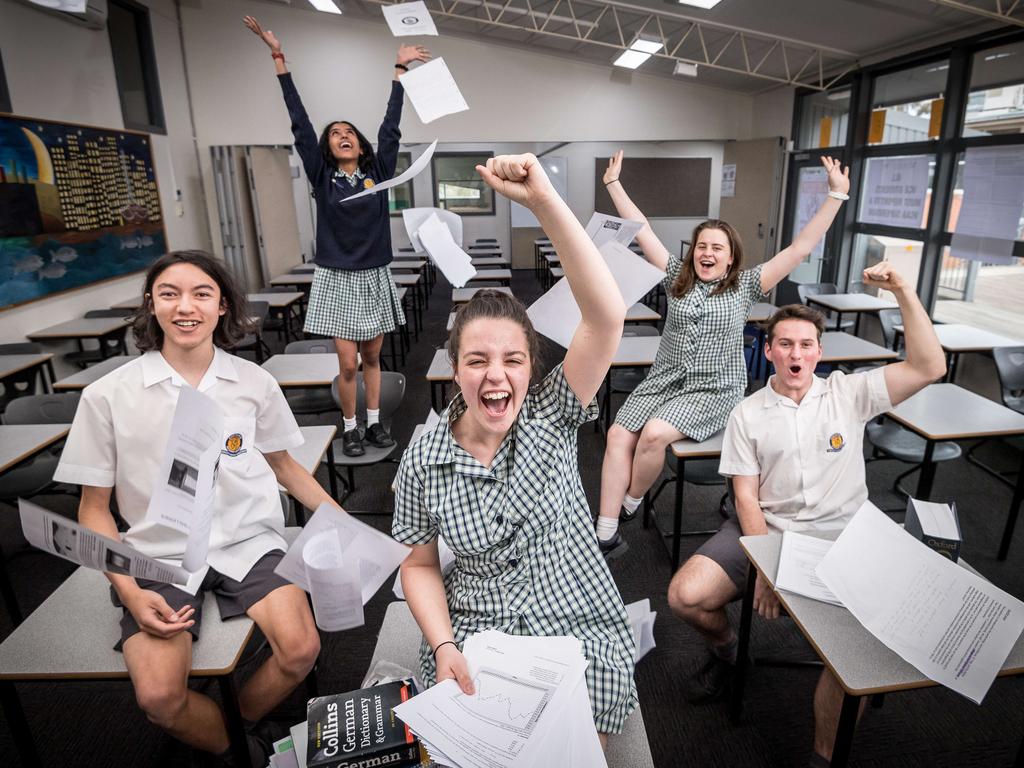VCE English exam 2024: Last minute tips and tricks revealed
With less than 24 hours to go before Victoria’s year 12s sit the English exam, examiners, tutors, teachers and star pupils offer last-minute tips and trick to ace the test, as well as the key pitfalls to avoid.
Victoria’s year 12 students will sit 2024’s first written VCE exam, English, on Tuesday.
In an unwelcome twist for stressed students, 2024 is the first year of a new study design.
With less than 24 hours to go, leading examiners, tutors, teachers and star pupils offer some last-minute tips and tricks, as well as pitfalls to avoid, for success — it’s not too late.
Here’s where students gain and lose marks in the English exam, what to do when you first get in there, and what examiners are looking for.

Experts
• VCAA Chief Assessor
• Danielle Cooper: Head of English at Strathcona Girls’ Grammar
• Mariam Riad: Lead tutor at Cluey Learning and a former VCE English teacher
• Amy Peatling: Expert tutor from Cluey Learning
• Rion Ahl: Co-founder of tutoring company 50Coach and a former VCE student who got 50 for English and a 99.95 ATAR
General tips for the English exam
• Bring your dictionary and make sure you know how to use it.
• In the exam, allocate equal time for each section.
• You don’t have to do the questions in order. Start with the section you find most challenging and end with the one that’s most comfortable for you.
• Don’t go too far over time; stop and go on to the next section.
• Plan all three answers at the beginning as you can forget what you’ve read and waste time re-reading it.
• In the reading time, spend more time on Section C.
• Make brief plans for all sections before beginning writing (approximately 3
minutes per plan).
• Save a few minutes to proofread what you have written at the end.
• Don’t bother using AI to prepare as teachers know all the tricks and can spot them easily. Make sure it is all your own work.
Two questions VCE English students want answered
How important is it to memorise lots of quotes from the texts?
The experts agree that quotes are a bonus, but not a substitute for good understanding of the text.
Ms Riad said there is “no point having ten quotes but no analysis — markers will prefer more analysis”.
Ms Cooper agrees.
“It’s more important to have analysis which is linked directly to the topic,” she said.
What if you can’t remember the quote?
Ms Cooper said it “depends how off it is — a word may not matter”.
“Free yourself from remembering copious quotes,” she said.
My handwriting is terrible, does it matter?
Yes, as the examiners want to read — rather than guess — what you have written.
Your teacher will have given you feedback on this.
Write on every second line if you need to or space it out to make it clearer.
Don’t worry about cross outs as they show you have rethought what you have written.

Section A 20 marks (one third of marks)
This question is similar to previous years.
You must write an analytical essay on one of two topics provided for your text.
Make sure you make clear which text you have chosen to write on and whether you have chosen to answer topic i or ii.
Ms Riad says students have to make sure they know the central themes, setting, characters and literary features of their text.
“The most important thing is to analyse the text, not just retell or summarise it,” she said.
Ms Cooper said section A is “an analytical task which should contain close analysis of the structure and language of the text”.
“You should know the text you are writing about and then select the topic that best suits you.”
She said there is “still time to re-read the text and this can be worthwhile”.
“You can’t fool the examiner. They can pick those who don’t know the text as the answers are very general,” Ms Cooper said.
She points out that although there is a new study design, there are only three new texts out of 20, so if you have chosen a text from previous years then you can do past exam questions as practice.

Mr Ahl said students should “reuse characters, reuse your best pieces of analysis but never reuse the points of your essay or the purpose in contention to the prompt — each essay you write has to have a unique one”.
Amy Peatling, an expert tutor from Cluey Learning, suggests that for films you include film techniques (camera angles, shots, acting, mise-en-scene, editing, lighting and sounds).
For plays also include stage directions and text-specific techniques like asides, soliloquies etc.
For novels, also consider the “three Ss”.
These are: the style of the writing (literary features and types of writing), the structure of the writing (organisation of chapters etc) and the syntax (eg use of punctuation, sentence structure).
Tips for Section A
• Make sure you know the text you have chosen to analyse.
• Make sure you unpack the question in the reading time, looking at all parts of the question, not just one word or phrase.
• Be wary of questions that contain words such as “never” or “does not” or “cannot” as they can be very narrow and harder to answer.
• Do essay plans for this question as they can be more useful at this stage than whole essays - you can do four plans in an hour then talk through them in study groups.
• Don’t use an example from your text if it is not relevant - you can’t include everything.

Section B 20 marks (one third of marks)
This is the section that’s most different from previous years.
Students are asked to create a piece of writing inspired by one of four framework ideas (country, protest, personal journey or play).
The task is to incorporate at least one of the following: to explain, to express, to reflect, to argue, and markers say this is essential for getting good marks.
Experts say it’s essential to ensure you use the title linked to your chosen framework and respond to at least one of three stimuli provided, which may be presented as texts or images.
“It’s important to write on the title, and make sure it’s front and centre, not just coming in with something memorised,” Ms Cooper said.
“Make sure you have a clear purpose and that this is apparent. The structure can be a speech, feature article, anecdote or internal monologue - the form is open and it’s a good idea to pick it ahead of time.”
She said examiners “want to reward students for original, interesting writing that uses the title and stimuli as a springboard.”
Ms Riad said students should make sure they don’t get thrown by the stimuli.
“There won’t be any hidden meaning in your stimulus — they are there to help, not hinder. It’s not a trick so take whatever is there at face value.”
Ms Peatling suggests you make sure your piece reflects the framework idea (go back to the VCAA definitions), the title provided and the stimulus.
“When proofreading, make sure that your type of text (speech, reflective essay etc.) is clear as well as your purpose (explain, reflect, express or argue),” she said.
Tips for Section B
• Use the practice paper on the VCAA website as a test for this question.
• Make sure the way you engage with your stimuli is clear.
• Don’t forget to explain, express, reflect or argue.
• Make sure you pick the right title for your framework - this is a common mistake made by nervous students.
• Ensure the whole piece of writing reflects the title - don’t just write the title at the top and leave it at that.
• You cannot write a poem, song or verse.
• Write to your strengths, for example, students interested in drama may write an internal monologue.

Section C 20 marks (one third of marks)
This section requires you to analyse an unseen piece of writing, spoken language and visuals, assessing the way the arguments are used to persuade an intended audience. You will have to write an analytical response.
Markers suggest you do this section first, as there is a lot of material to read. So, go through it during the reading time and then write your response while it is fresh in your mind.
Ms Cooper said this section is similar to past exams, except that there is only one provided text and one or more visual texts.
“This means you can draw on sample exams from 2018 to 2023 but not 2019, which are on the VCAA website,” she said.
“These are a goldmine for preparation.”
She said the section is an analysis, not an essay.

“Concentrate on how the audience is left to think and feel about the issue.”
“Analyse, don’t summarise the texts or visuals. Avoid copying slabs of the material in the exam.”
Mr Ahl said students should focus on the “specific language choices, but also how arguments are made more effective by being structured in a specific order”.
Tips for Section C
• In your answer you have to analyse the piece of writing, isolating the arguments used and the language.
• Look at the structure of the argument — why is it ordered in a certain way? Assess the language used, the tone and the words chosen.
• Before you start, annotate the texts quickly, underlining the different devices.
• You don’t need a conclusion for this section — focus instead on how the writer finishes their piece, and the impact it is intended to have on the audience.
• Focus on the why and how of the piece of writing provided, not summarising what is written.
• Do timed practices so you can comfortably finish this piece of writing.
Final word from Rion Ahl

Remember: no matter how gruelling the journey has been, no matter how tired you
are – the hardest times are behind you.
So, whether you need a high ATAR or not, you might as well put in those final hours of absolute focus – because once you walk out of that final exam, you can breathe easy.
If you feel underprepared now, then work twice as hard until you feel more confident.
The more practice exams you can squeeze in, the more familiar and adept you become at navigating the VCE.
If you’re in Year 11, set yourself a challenge to a practice exam a day.
If you’re in Year 12, plan out what exams you plan to do every day up until exam day.
Trust me – the effort pays off.
Originally published as VCE English exam 2024: Last minute tips and tricks revealed



